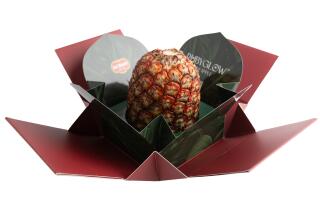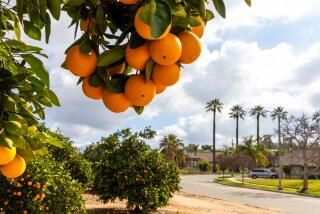Irradiated Papayas to Get Market Test in L.A.
- Share via
Hawaiian papaya growers have organized an unusual sale in the Los Angeles area today or Sunday to test consumer attitudes toward buying fruit that has been irradiated to eliminate possible Oriental fruit fly infestation.
Organizers--Management Associates of Irvine--have kept the location and time of the sale secret, however, to minimize anticipated opposition from a consumer group to the process of using gamma rays to eliminate pests.
It is only the second time that irradiated fruit will be sold commercially in the United States; irradiated mangoes were sold in Florida in September.
At stake in Sunday’s test, organizers say, is the health of the $25-million Hawaiian papaya industry. The Papaya Administrative Committee, a Honolulu group which commissioned the test, wants to use irradiation to fight a continuing fruit fly infestation. Growers say the current treatment method using hot water adversely affects the fruit’s flavor and texture. And a shipment of papaya to California was blocked earlier this month when it was found to contain fruit fly larvae.
California agriculture officials have said they would consider banning all shipments of the fruit to prevent any spread of the pest if more flies or larvae are discovered.
Irradiation was developed in the 1920s by a French scientist as a means of preserving food. The discovery was followed by Army-funded research in the 1940s. After study by public and private agencies, the Food and Drug Administration last year approved irradiation as a treatment for produce infestation. Previously, the agency had granted only limited use on spices, potatoes, wheat and pork.
Even so, there are no irradiated products now sold in this country. One drawback to availability is the question of consumer acceptance.
Several groups have actively opposed irradiation, including the National Coalition to Stop Food Irradiation in San Francisco. Recent measures in Congress would rescind the FDA approval.
To counter anticipated opposition, organizers say they will be present at the one or two stores where 600 pounds of the fruit will be sold. They plan to ask for consumer reaction. The irradiated fruit will be identified, as required by federal regulations.
“What we are trying to do is conduct a reasonable, although small-scale, (marketing) experiment,” said Bruce Meyer of Radiation Sterilizers, whose Tustin facility irradiated the fruit. “Given a choice of such good fruit we think (people) will buy it.”
Robert Souza of the Papaya Administrative Committee said his group received a one-time-only permit from the U.S. Department of Agriculture to conduct the survey. “We want as objective a test as possible and we don’t want (coalition representatives) going around scaring people,” Souza said.
Representatives of the National Coalition to Stop Food Irradiation have said they will picket any store that sells the irradiated fruit.
“When we find (the test site) then we are going down to the stores, picket them and hand out literature about what food irradiation is and what our concerns are so that people can make an educated decision on it,” said Kathleen M. Power, Los Angeles coordinator for the consumer group.
Opponents argue that irradiation using such materials as cesium 137 poses an environmental risk during both transportation and use, and question the health effects of eating treated fruit.
A representative of the United Fresh Fruit and Vegetable Assn., which favors irradiation, dismissed safety concerns. “It is completely safe,” Sharon Bomer said.
More to Read
Eat your way across L.A.
Get our weekly Tasting Notes newsletter for reviews, news and more.
You may occasionally receive promotional content from the Los Angeles Times.









